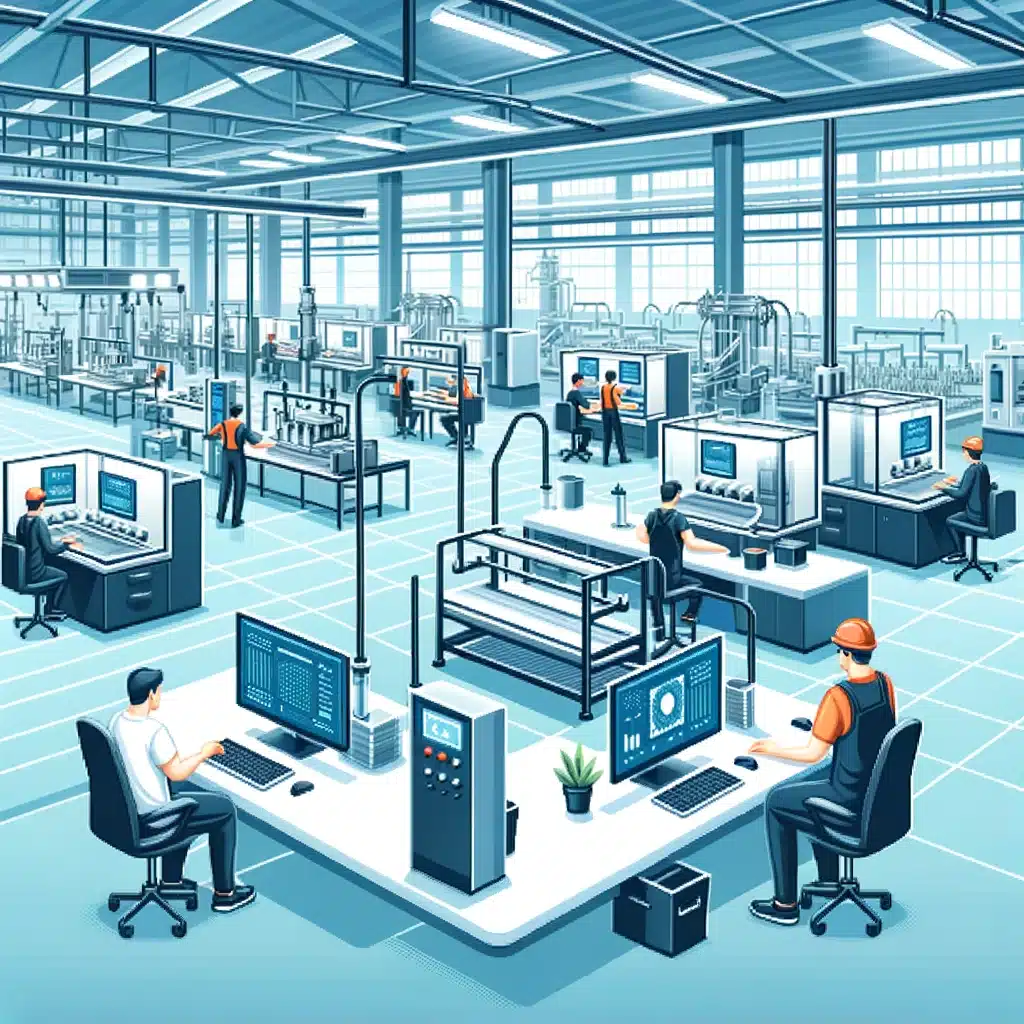Factory worker’s lexicon
Category: Factory Worker
Description
A
- Andon: Visual signaling system to indicate production problems in real-time.
- Assembly line: A manufacturing process in which parts are added to a product in a sequential manner.
- Autoclave: Device used for sterilizing or processing materials under high pressure and temperature.
B
- Bobbin: Roll of material, such as wire or metal, used in various production processes.
- Bolt: A threaded fastener used to join two or more parts together.
- Brazing: A metal-joining process that involves melting a filler metal to bond two or more pieces without melting the base materials.
C
- Cobot (collaborative robot): Robot designed to work directly alongside human workers.
- Conveyor: A mechanical apparatus that transports materials or products from one point to another.
- Calibration: The process of adjusting and setting instruments to ensure accurate measurements.
D
- Deburring: Process of removing burrs and sharp edges from machined parts.
- Downtime: Period when production is stopped due to maintenance or malfunctions.
- Die: A specialized tool used in manufacturing to shape or cut materials.
E
- Ergonomics: The study of designing equipment and workplaces to fit the user’s needs and improve efficiency and safety.
- Extrusion: A process used to create objects of a fixed cross-sectional profile by pushing material through a die.
- Efficiency: The ratio of the useful work performed by a machine or in a process to the total energy expended.
F
- Forklift: A vehicle with pronged devices used to lift and move materials.
- Fixture: A support or work-holding device used in manufacturing.
- Fabrication: The process of constructing products by cutting, bending, and assembling materials.
G
- Gantry crane: A crane that moves on a gantry, used for lifting heavy loads.
- Gage (Gauge): Instrument used to measure dimensions or the amount of something.
- Grinding: The process of wearing down or smoothing by friction.
H
- Hydraulics: The use of liquid fluid power to perform work.
- Hoist: A device used for lifting or lowering a load.
- Hopper: A container for storing bulk materials that are dispensed through a bottom opening.
I
- Inspection: The process of examining products or processes to ensure they meet standards.
- Inventory: The raw materials, work-in-progress, and finished goods considered to be part of a business’s assets.
- Injection molding: A manufacturing process for producing parts by injecting molten material into a mold.
J
- Jig: A custom-made tool used to control the location and/or motion of parts or other tools.
- JIT (Just-In-Time): Inventory strategy to increase efficiency and decrease waste by receiving goods only as they are needed in the production process.
- Jointing: The process of connecting or joining two or more components together.
K
- Kanban: A scheduling system for lean manufacturing and just-in-time manufacturing.
- Kiln: A furnace or oven for burning, baking, or drying materials.
- Kitting: The process of gathering the necessary components and parts for a manufacturing process.
L
- Lathe: A machine tool used to shape materials by rotating them against cutting tools.
- Lean manufacturing: A systematic method for waste minimization within a manufacturing system.
- Logistics: The detailed coordination of a complex operation involving people, facilities, or supplies.
M
- Maintenance: Routine actions taken to keep equipment and machinery running smoothly.
- Milling machine: A machine tool that removes material from a workpiece by rotating a cutting tool.
- Manometer: An instrument for measuring the pressure of gases or liquids.
N
- Nondestructive testing (NDT): Testing methods used to examine materials or components without causing damage.
- Numerical control (NC): The automation of machine tools operated by precisely programmed commands encoded on a storage medium.
- Nut: A fastener with a threaded hole used in conjunction with a bolt.
O
- Overhead crane: A crane with a hoist that travels along an overhead beam.
- Operator: A person who operates machinery or equipment in a factory.
- Outsource: To obtain goods or services from an outside supplier.
P
- Pallet: A flat transport structure that supports goods in a stable fashion while being lifted by a forklift.
- Press: A machine used to apply force to an object, often to shape or cut it.
- PPE (Personal Protective Equipment): Safety gear worn to protect against hazards.
Q
- Quality control: The process of ensuring products meet specified standards and requirements.
- Quenching: Rapid cooling of a material to set its structure or properties.
- Quotas: Pre-set production targets or limits.
R
- Robot: A programmable machine capable of performing complex tasks automatically.
- Rework: The process of correcting defective or non-conforming items.
- Rotary table: A precision work positioning device used in metalworking.
S
- Soldering: The process of joining two or more items by melting a filler metal into the joint.
- Supply chain: The entire network of entities involved in producing and delivering a product.
- Safety stock: Extra inventory held to prevent stockouts due to demand or supply variability.
T
- Tooling: The process of providing or adapting tools for manufacturing.
- Turbine: A rotary mechanical device that extracts energy from a fluid flow.
- Turnaround time: The time taken to complete a process or fulfill an order.
U
- Ultrasonic testing: A technique of inspecting materials using high-frequency sound waves.
- Uninterruptible power supply (UPS): A device providing emergency power during a main power failure.
- Utility knife: A knife used for general or utility purposes.
V
- Vise: A clamping device used to hold an object in place while work is being done on it.
- Vacuum forming: A manufacturing process where a plastic sheet is heated, stretched over a mold, and held in place by a vacuum.
- Value stream mapping: A lean-management method for analyzing the current state and designing a future state for a series of events.
W
- Welding: The process of joining materials, usually metals or thermoplastics, by causing coalescence.
- Warehouse: A large building where raw materials or manufactured goods are stored before their distribution.
- Work order: A document detailing tasks to be completed for manufacturing or maintenance purposes.
X
- X-ray inspection: The use of X-rays to view the internal structure of objects for quality control.
- X-axis: The horizontal axis in a coordinate system used in CNC machines.
- Xenon: A chemical element used in certain types of lamps and as a general anesthetic.
Y
- Yield: The amount of product produced relative to the amount of raw material used.
- Yoke: A clamp or fitting that holds two or more components together.
- Yarn: Continuous strands of fibers used in textile manufacturing.
Z
- Zero defects: A quality management philosophy aimed at reducing and eliminating defects.
- Zinc plating: A process where a layer of zinc is applied to a metal to protect against corrosion.
- Zone: A specific area within a factory designated for a particular process or function.
Additional information
| Publication | |
|---|---|
| Level | Technician |
| Department | Manufacturing |






